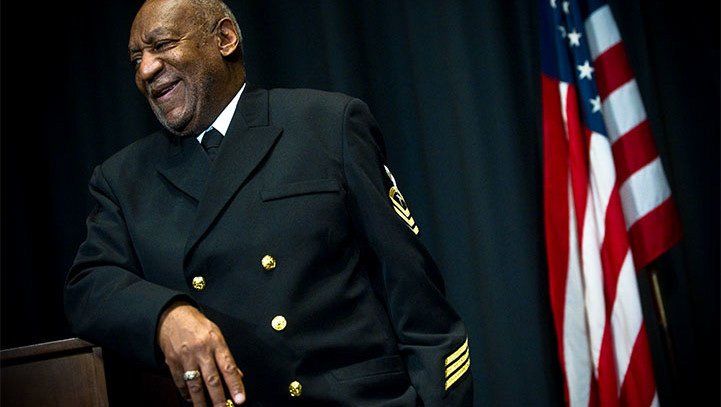
Although this case may appear to be a straightforward defamation lawsuit, it’s based upon a very unique background. The surface facts of Dickinson v. Cosby involve celebrity model Janice Dickinson accusing actor/comedian Bill Cosby of defaming her after she claimed he raped her back in 1982. In her pleadings, Ms. Dickinson describes herself as “an internationally known fashion model, photographer and author, often called ‘the world’s first supermodel.’” She also notes that she’s frequently active in various media projects.
The Bill Cosby she is suing is the actor/comedian still remembered for his acting roles on TV’s “I Spy” and “The Cosby Show” who still performs in public.
Background Facts and Accusations Leading Up to This Case
According to ABC News, comedian Hannibal Burgess performed a comedy routine in Philadelphia in October 2014 that referenced Bill Cosby as “a rapist.” Since that time, audio/video clips from that routine, often including various bits of commentary, have been viewed numerous times on the Internet.
Those fairly new to the Dickinson lawsuit have recently been trying to learn more about Temple University employee Andrea Constand’s civil lawsuit against Bill Cosby for drugging and raping her back in 2004. The attorneys in that case had 13 witnesses ready to testify about alleged similar claims. Still others are reading about the accusations of Joan Tarshis , now in her late 60s, who alleges that Cosby abused her back in 1969.
Perhaps the main reason this lawsuit has been filed is due to the defendant’s response to the plaintiff’s December 2014 CNN interview in which she strongly accused Mr. Cosby of raping her back in 1982. Shortly thereafter, ETOnline states that Cosby’s lawyer refuted Ms. Dickinson’s claims by saying “Janice Dickinson’s story accusing Bill Cosby of rape is a lie.”
Defamation is a Tort. What Must the Plaintiff Claim to Win?
According to the Legal Information Institute, “Defamation is a statement that injures a third party’s reputation.” This reputable source further indicates that in order to win a defamation lawsuit, the plaintiff must prove four things:
“(1) A false statement purporting to be fact; (2) publication or communication of that statement to a third person; (3) fault; and (4) damages, or some harm caused to the person or entity who is the subject of the statement.”
Ms. Dickinson’s lawyers should be able to easily prove that the comment made by Mr. Cosby’s attorney claiming her accusations were “a lie” was widely disseminated throughout the media “to third persons” in late 2014. Likewise, the plaintiff’s ongoing activities in the media (referenced in her complaint ) should help prove that being branded a “liar” in the press might cause her serious future difficulties (“damages”) when trying to negotiate new contracts and projects.
Since Ms. Dickinson is generally viewed as a “public figure,” the New York Times v. Sullivan standard requiring proof of some form of actual “malice” will likely apply. Proving this point may require strong advocacy by her lawyer. Hopefully, Ms. Dickinson’s stated desire for a jury trial will become a reality since this case involves extensive (alleged) ties to rape – a serious societal concern that many fail to ever address appropriately.
Mr. Cosby Must Step Forward with the Integrity He Expects of Others
Although many people in Hollywood started distancing themselves from Mr. Cosby after this scandal was reignited in late 2014, he still has many long-term fans who will be closely watching his every move. They are expecting a sincere openness and transparency as he seeks to defend himself. Surely he’ll work hard to rescue his reputation or “legacy” that some think can no longer be saved.
Early indications are mixed since the media recently reported that Mr. Cosby’s lawyer has already moved to block the release of past documents which might provide critical insights into his claimed innocence. Furthermore, Bruce Castor’s comments to CNN are very troubling. He was the prosecutor in the Andrea Constand sexual assault case that Mr. Cosby chose to settle back in 2006. According to a November 2014 article , Castor “told CNN that he believed Cosby . . . lied to authorities” about what happened in the Constand case.
What the Public Deserves vs. What They May Actually Receive
Given the fact that fewer than half of all criminals guilty of “forcible rape” are ever caught, arrested or charged for the crime, all women who make claims of rape deserve our respect, even when their pain and humiliation causes delays in their reports. Hopefully, Mr. Cosby and those defending him will bear that reality in mind as they come forward with proof to refute the current claims against him – both those regarding defamation and those pertaining to the underlying accusations of rape.
America’s past decade has been painfully riddled with famous people claiming innocence regarding numerous crimes or gross improprieties – perhaps either due to some type of narcissism or denial — only to wind up letting the public down.
Maybe this case will prove different – and Mr. Cosby will respectfully address the seriousness of all that’s being alleged. The unvarnished truth can prove very powerful. Surely Mr. Cosby’s remaining fans deserve a ready openness that will make it clear that he’s not the tragic figure depicted in Vanity Fair’s article back in February of 2015.
By Elizabeth Smith, freelance writer and graduate of the University of Texas Law School.






